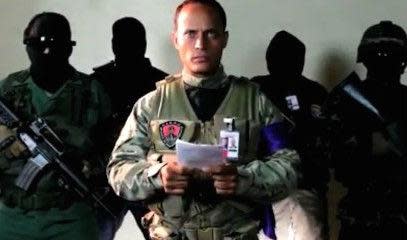Venezuelan authorities hunt police pilot and part-time film actor behind helicopter attack on Supreme Court
The Venezuelan authorities said they were hunting a police pilot and part-time movie actor, who used a helicopter to launch a grenade attack on the Supreme Court in what President Nicolas Maduro called an assault by “terrorists”.
Reports said Oscar Perez had gone into hiding after carrying out the attack on the nation’s highest court and its interior ministry, firing a total of 15 bullets and dropping four grenades on the buildings, which were occupied at the time.
In a video message posted on social media, Mr Perez described himself and those supporting him, as a “coalition of military and police officers” concerned about the actions of the “criminal government”.
This video allegedly shows helicopter flying above Venezuela's Supreme Court, piloted by rogue forensic police officer Oscar Perez https://t.co/1UpN5yeXGd
— Eva Golinger (@evagolinger) June 28, 2017
“We have two choices: be judged tomorrow by our conscience and the people or begin today to free ourselves from this corrupt government,” he said, reading from a manifesto in front of four figures dressed in military fatigues and wearing ski masks.
Mr Maduro, who had been speaking live on state television when the incident happened on Tuesday evening, was quick to condemn the incident as the latest attempt to wrest power from his elected government. There were no reports of injuries.
“Sooner rather than later, we are going to capture the helicopter and those behind this armed terrorist attack against the institutions of the country,” he said. “They could have caused dozens of deaths.”
Eva Gollinger, a lawyer and a supporter of the government, wrote on Twitter: “Rogue forensic police officer flew a police helicopter over Venezuela's Supreme Court and called for uprising against Maduro government.”
Yet Reuters said many opponents of the Venezuelan leader quickly claimed on social media the incident had been planned by Mr Maduro himself in order to justify a crackdown against those seeking to block his plans to rewrite the constitution.
For the last three months, Venezuela has been increasingly rocked by antigovernment protests. At least 75 people have been killed and several hundred injured.
Demonstrators are demanding fresh elections, measures to alleviate a stark economic crisis, and freedom for hundreds of jailed opposition activists.
Mr Maduro, who was elected in the spring of 2013, took over from the controversial Hugo Chavez, after his death from cancer. For many years, Mr Chavez was a hero to many on the left as he invested in social programmes using the country's oil wealth.
As his rule continued, however, others accused him of becoming increasingly authoritarian and of failing to diversify the country’s economy. The US supported enemies of Mr Chavez, who briefly ousted him in a 2002 couple and Washington channelled hundreds of thousands of dollars to his opponents via the so-called National Endowment for Democracy.
A post shared by OSCAR PEREZ (@oscarperezgv) on Jun 27, 2017 at 4:18pm PDT
Mr Maduro wants a July 30 vote for a special super-body called a Constituent Assembly, which could rewrite the national charter and supersede other institutions such as the opposition-controlled congress. He has suggested that the assembly is a way to calm the country, but his opponents want to bring forward the next presidential election, scheduled for late 2018.
Mark Weisbrot, a regional expert and director of the Centre for Economic and Policy Research, told The Independent he feared the country could end up heading to a civil war. He said the only solution was a negotiation and election that carried guarantees for both sides.
“The country is highly polarised. Most people seem to think it’s just a mass uprising against an unpopular dictator,” he said. “But there are 140,00 in the military and 300,000 in armed militias. It’s a violent place.”
Information Minister Ernesto Villegas said the security forces had been deployed to apprehend Mr Perez as well as recover the stolen German-built Bolkow helicopter. The Associated Press said photographs of the pilot standing in front of the US Capitol in Washington and a US Coast Guard helicopter were displayed on state television to promote the government's case that he was taking instructions from the CIA.
On his Instagram account, Mr Perez said he was a police investigator and tactical helicopter pilot whose true passion was his country. In 2015, he starred in a film called “Suspended Death” and several cinematic-like photos show him in fatigues bearing assault rifles, sky diving and standing in action poses with a dog by his side.
National Assembly President Julio Borges expressed doubts about Mr Maduro’s version of events, but he also cautioned that the opposition were still analysing what happened.
“There are people who say it was a government-staged hoax, others who say it was real,” he said. “Whatever it was, it all points in the same direction: that the situation in Venezuela is unsustainable.”

 Yahoo News
Yahoo News 

